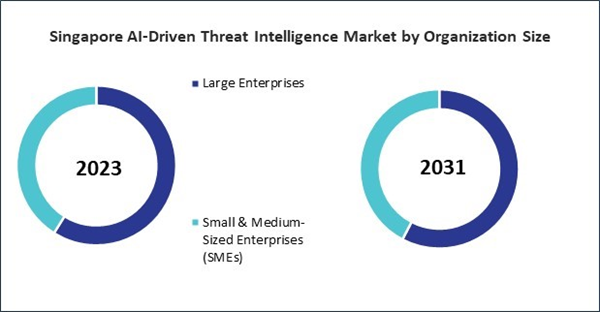The China market dominated the Asia Pacific AI-Driven Threat Intelligence Market by Country in 2023, and is expected to continue to be a dominant market till 2031; thereby, achieving a market value of $1.59 billion by 2031. The Japan market is capturing a CAGR of 23.2% during 2024-2031. Additionally, the India market would register a CAGR of 24.8% during 2024-2031.
As e-commerce expands, especially in developing regions where digital transformation is accelerating, the need for AI-powered cybersecurity solutions will continue to grow. AI-driven systems are invaluable for detecting localized threats, safeguarding customer data, and ensuring seamless platform operations.
In addition, conventional cybersecurity solutions are expensive, necessitating substantial investments in personnel, software, and hardware to effectively monitor and maintain systems. These solutions frequently depend on manual processes and human intervention, which can be resource-intensive and time-consuming. Businesses with large networks or complex infrastructures frequently need to hire sizable security teams to handle threat detection, analysis, and response. This adds to operational costs, making it challenging for many organizations to sustain a robust cybersecurity framework, especially as cyber threats evolve and become more sophisticated.
In China, the telecommunications sector is at the forefront of digital transformation, managing vast volumes of customer data and digital identities. Telecom giants like China Mobile handle millions of accounts, each requiring secure identity management. According to the Ministry of Industry and Information Technology, the aggregate business revenue of telecom companies reached 1.68 trillion yuan (around 236 billion U.S. dollars) in 2023, representing a 6.2 percent annual increase.
Emerging technologies like the Internet of Things, cloud computing, and big data have continued to drive this growth, with 5G mobile users reaching 561 million - approximately one-third of China’s mobile phone users. This rapid digitalization, particularly in the telecom sector, has accumulated massive amounts of sensitive personal and financial data, making these companies prime targets for cyberattacks. As a result, the demand for AI-driven threat intelligence solutions is expected to grow significantly as telecom companies look to protect against data breaches and cyberattacks. Hence, the AI-driven threat intelligence market in Asia Pacific is poised for rapid growth.
List of Key Companies Profiled
- Check Point Software Technologies Ltd.
- Trellix
- Broadcom, Inc. (Symantec Corporation)
- Juniper Networks, Inc.
- LogRhythm, Inc.
- McAfee Corp
- Trend Micro, Inc.
- IBM Corporation
- Cisco Systems Inc.
- ZeroFox Holdings, Inc.
Market Report Segmentation
By Deployment Mode- Cloud
- On-premise
- Solution
- Threat Intelligence Platforms
- Security Information and Event Management (SIEM)
- Security Orchestration, Automation, and Response (SOAR)
- Other Solution Type
- Services
- Professional Service
- Consulting
- Managed Service
- Other Services Type
- Large Enterprises
- Small & Medium-Sized Enterprises (SMEs)
- Threat Detection
- Risk Management
- Security Operations
- Incident Response
- Other Application
- BFSI
- Government & Defense
- IT & Telecom
- Healthcare & Lifesciences
- Retail & eCommerce
- Energy & Utilities
- Manufacturing
- Other Industry Vertical
- China
- Japan
- India
- South Korea
- Singapore
- Malaysia
- Rest of Asia Pacific
Table of Contents
Companies Mentioned
Some of the key companies profiled in this Asia Pacific AI-Driven Threat Intelligence Market include:- Check Point Software Technologies Ltd.
- Trellix
- Broadcom, Inc. (Symantec Corporation)
- Juniper Networks, Inc.
- LogRhythm, Inc.
- McAfee Corp
- Trend Micro, Inc.
- IBM Corporation
- Cisco Systems Inc.
- ZeroFox Holdings, Inc.









